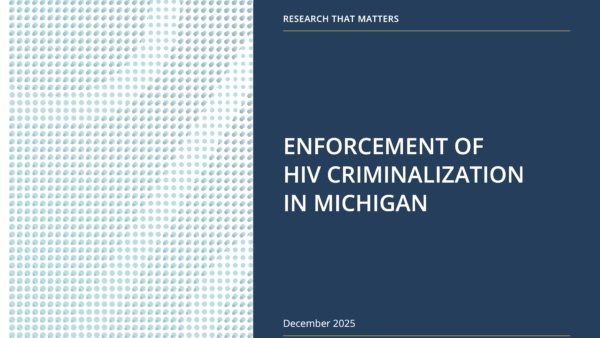Source: El Tiempo, April 27, 2019 – Google translation, for article in Spanish, please scroll down.
Is Penalising HIV infection discriminating?
Should a person who transmit HIV or hepatitis B go to jail for 6 years? That is the debate that the Constitutional Court will have to settle in the coming days, by resolving a lawsuit against the law that criminalizes the transmission of these diseases.
The plaintiff considers that Article 370 of the Criminal Code violates the rights to equality and restricts the free development of personality, in particular, sexual freedom. This law establishes that there will be imprisonment of 6 to 12 years for those who, knowing that they have HIV or hepatitis B, “perform practices through which they may contaminate another person, or donate blood, semen, organs or, in general, anatomical components”
According to the lawsuit, this penalizes the fact that a person living with these diseases has sex, and makes it a crime regardless of whether preventive measures, such as antiretroviral treatments and others, are taken that make the transmission of diseases unlikely.
Thus, the plaintiff says that although the purpose of this mechanism is to protect public health, this does not justify prohibiting a population group from freely expressing their sexuality, and adds that there would be no harm when there are consensual relationships in which measures are taken to prevent infections.
On the violation of equality, the plaintiff says that the article only refers and penalizes people with HIV or hepatitis B, and not others with potentially contagious and sensitive diseases.
The debate is broad, in total the Court received 15 statements of opinion from different organizations, ministries, universities, and even the Constitutional Court of South Africa, to feed its considerations. And there are almost as many arguments in favour as there are against.
For example, the Colombian Anti-AIDS League supported the demand because it considered that rights were violated, adding that laws that criminalize exposure to HIV leave the burden of prevention to the people who live with it and said that the real challenges are more education and better access to medical testing services and counselling
The statement sent by Edwin Cameron, magistrate of the Constitutional Court of South Africa and who lives with HIV since 1985, points out the harm of criminalizing people living with HIV, as it increases the stigma and makes it harder for them to dare to seek medical help and prevention information
He also said that to resort to norms that criminalize HIV, the UN recommends to governments that they address only those who intentionally spread the virus and concluded that if the goal is to safeguard public health, it is more effective to have better prevention and care programmes.
The statement sent by the Ministry of Justice gives the plaintiff reason that the rule is discriminatory because it is directed only to people with HIV – who have also been recognized as subjects of special constitutional protection – or hepatitis B and adds that there is no justification for the rule to be for people with these two diseases and not for others who are aware of having different infectious-contagious diseases
However, with regard to the restriction on sexual freedom, the Justice Department considered that the rule “does not violate the right to the free development of personality, but is limited to establishing the criminal consequences resulting from its abusive and harmful exercise against the rights of other people and the community “ For all this, it asks the Court to study the lawsuit and decide.
The Ministry of Health indicated, on the contrary, that the rule does not violate either the right to equality or the free development of the personality, but rather that the demand is based on an inference from the plaintiff that this restricts sexual freedom, and therefore asks to leave the rule as it is.
The Attorney General agrees that the plaintiff interpretation is that the law punishes the fact of having sex even when there is no transmission of the disease, which, says the Public Ministry, is not true. For the Attorney General’s Office, the rule is clear that in order for the offense to be established there must be an intention to cause harm by carrying out practices that could end in transmission. Because of this, the reasons for the claim are not valid and the Court is being asked not to study it and declare itself inhibited
In any case, the decision will be made by the Court, the lawsuit was handed over to Judge Cristina Pardo, who has already made a presentation that will be debated in the next few days by the Court’s full chamber.
¿Penalizar el contagio de VIH es discriminar?
Demanda dice que tipificar la propagación del virus discrimina a personas con VIH o hepatitis B.
27 de abril 2019 , 08:00 p.m.
¿Debe ir a la cárcel por 6 años una persona que contagie a otra de VIH o hepatitis B? Ese es el debate que deberá zanjar la Corte Constitucional en los próximos días, al resolver una demanda contra la ley que penaliza la propagación de estas enfermedades.
El demandante considera que el artículo 370 del Código Penal vulnera los derechos a la igualdad y restringe el libre desarrollo de la personalidad, en particular, la libertad sexual. Esta ley establece que habrá prisión de 6 a 12 años para quien, sabiendo que tiene VIH o hepatitis B, “realice prácticas mediante las cuales pueda contaminar a otra persona, o done sangre, semen, órganos o en general componentes anatómicos”.
De acuerdo con la demanda, esto penaliza el hecho de que una persona que viva con estas enfermedades tenga sexo, y lo convierte en delito sin importar si se toman las medidas preventivas que hacen improbable la transmisión de enfermedades, como tratamientos antirretrovirales y otros.
Así, el demandante dice que aunque el fin de esta media es proteger la salud pública, esto no justifica prohibirle a un grupo poblacional expresar libremente su sexualidad, y agrega que no habría afectación cuando se tienen relaciones consensuadas en las que se toman medidas para prevenir contagios.
Sobre la vulneración a la igualdad, dice que el artículo solo se refiere y penaliza a personas con VIH o hepatitis B, y no a otras con enfermedades también potencialmente contagiosas y delicadas.
El debate es amplio, en total la Corte recibió 15 conceptos de diferentes organizaciones, ministerios, universidades, e incluso de la Corte Constitucional de Sudáfrica, para alimentar sus consideraciones. Y hay casi tantos argumentos a favor como los hay en contra.
Por ejemplo, la Liga Colombiana de Lucha contra el Sida apoyó la demanda pues consideró que sí se vulneran los derechos, agregó que leyes que penalizan la exposición al VIH dejan toda la carga de la prevención a las personas que viven con él y dijo que los verdaderos desafíos son más educación y mejor acceso a servicios de pruebas médicas y consejería.
El concepto enviado por Edwin Cameron, magistrado de la Corte Constitucional de Sudáfrica y quien vive con VIH desde 1985, señala los perjuicios de criminalizar a las personas que viven con esa enfermedad, pues incrementa el estigma y hace más difícil que se atrevan a buscar ayuda médica e información sobre prevención.
También dijo que de recurrir a normas que criminalicen el VIH, la ONU recomienda a los gobiernos que estas se dirijan solo a quienes intencionalmente propagan el virus y concluyó que si el objetivo es salvaguardar la salud pública, es más efectivo tener mejores programas de prevención y atención.
El concepto enviado por el Ministerio de Justicia le da la razón al demandante en que la norma es discriminatoria pues está dirigida únicamente a personas con VIH –que además han sido reconocidas como sujetos de especial protección constitucional– o hepatitis B y agrega que no se advierte justificación para que la norma sea para personas con esas dos enfermedades y no para otras que son conscientes de tener enfermedades infectocontagiosas riesgosas distintas.
Sin embargo, frente a la restricción a la libertad sexual, la cartera de Justicia consideró que la norma “no vulnera el derecho al libre desarrollo de la personalidad, sino que se limita a establecer las consecuencias penales que acarrea su ejercicio abusivo y lesivo frente a los derechos de las demás personas y la comunidad”. Por todo esto, le pide a la Corte que estudie la demanda y decida.
El Ministerio de Salud indicó, al contrario, que la norma demandada no vulnera ni el derecho a la igualdad ni el libre desarrollo de la personalidad, sino que la demanda se basa en una inferencia del accionante de que esto restringe la libertad sexual, por lo que pidió dejar la norma tal y como está.
La Procuraduría coincide en que el demandante interpreta que la norma castiga el hecho de tener sexo aun cuando no exista transmisión de la enfermedad, lo cual, dice el Ministerio Público, no es cierto. Para la Procuraduría, la norma es clara en que para que se configure el delito debe existir una intención de causar daño realizando prácticas que podrían terminar en contagio. Por esto, las razones para la demanda se caen y le pidió a la Corte no estudiarla y declararse inhibida.
En todo caso, la decisión será de la Corte, la demanda le correspondió por reparto a la magistrada Cristina Pardo, quien ya hizo una ponencia que será debatida en los próximos días por la sala plena de la Corte.









